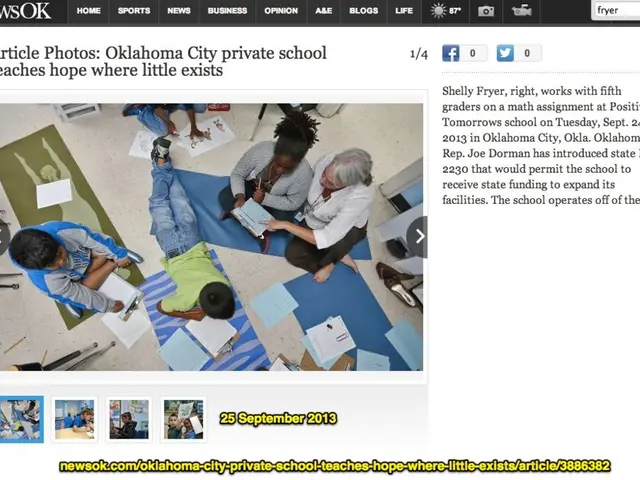Europe'sInviting Academic Realm: Wooing U.S. Scholars Amid Trump's University Assaults
In a bold maneuver, French President Emmanuel Macron and European Commission President Ursula von der Leyen are hosting a conference in Paris to lure US-based scholars amidst Donald Trump's crackdown on academia and research institutions. This move comes as the EU announces half a billion euros in incentives to entice international academics to the old continent.
The Choose Europe for Science conference at the famed Sorbonne University targets academics and researchers who fear their work may be endangered by billions in proposed US government spending cuts for universities and research bodies, as well as attacks on diversity policies and pro-Palestinian demonstrations.
The Trump administration's policies, including revocations of permanent residency status for students, have sparked concerns about academic freedom, a cornerstone of American education. US universities and research facilities have faced increasing political pressure under Trump, including threats of federal funding cuts.
The EU is aiming to attract researchers working in fields such as health, climate, biodiversity, artificial intelligence, and space. Meanwhile, von der Leyen urges EU member states to invest 3 percent of their GDP in research and development by 2030.
The European Union's push to open its doors to US-based researchers is not new. In April, Macron appealed to US university staff to "choose France" and unveiled plans for a funding program to cover the costs of bringing over foreign scientists. Europe intends to argue that University pay gaps will seem less significant when the lower cost of education, healthcare, and more generous social benefits are factored in.
While Europe may not instantly match the US in scientific capability for several decades, it hopes to provide a political haven and a universalist vision to US scholars seeking a safe environment for their research. Some US scientists have raised concerns about language barriers, unfamiliar laws, and employment practices, as well as lower research funding and remuneration in Europe.
However, the EU's efforts have been met with interest. Aix-Marseille University in the south of France has received interest from 120 researchers at institutions across the US, including NASA and Stanford University in California, for its 17 million euro "safe space for science" program.
Germany is also preparing to lure up to 1,000 researchers, according to coalition talks for a new government, in response to the upheaval in US higher learning. Despite Europe's efforts, it is not entirely free from controversy, with Germany accused of silencing pro-Palestinian voices in recent deportation cases.
In this game of academic chess, Europe seeks to position itself as a haven for academia and an alternative to the political and ideological climate brewing in the US under Trump. As the future unfolds, we'll see whether Europe's strategy will pay off and attract the brightest minds away from the US. But for now, the French and European leaders have rolled out the welcome mat, promising a safer, more stable environment for scientific inquiry and collaboration.
- The Confederation of European politics and the French administration are aggressively courting scholars from the United States, citing potential threats to academic freedom under the current administration.
- As part of the approach, the EU is extending significant financial incentives in fields such as health, climate, biodiversity, artificial intelligence, and space to draw international academics to the continent.
- Surmising the impending government cuts for universities and research bodies in the US, the Choose Europe for Science conference targets academics and researchers who may find their work at risk.
- European Commission President Ursula von der Leyen is urging EU member states to increase research and development expenditure to 3% of their GDP by 2030 to build a stronger foundation for scientific exploration.
- Beyond finances, the EU is marketing a more stable and politically neutral environment for research, as opposed to the ideological environment present in US academia under the Trump administration.







